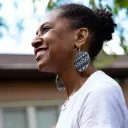Stay in the Loop
BSR publishes on a weekly schedule, with an email newsletter every Wednesday and Thursday morning. There’s no paywall, and subscribing is always free.
Beyond guns: What the world needs now
The Connecticut shootings: Symptoms and causes

In the wake of last week's shootings in Newtown, Connecticut, someone posted a quotation on Facebook: "We must be concerned not merely with who murdered them, but about the system, the way of life, the philosophy that produced the murderers."
That quote comes from Martin Luther King Jr.'s eulogy for the four young girls who died in the firebombing of the 16th Street Baptist Church in Birmingham, Alabama, in 1963. The circumstances surrounding the two atrocities are very different, but the question remains: Is there something wrong with a society in which mass shootings occur so frequently that they fade from consciousness after a few days, as was the case with the recent similar Oregon shopping mall shooting? And if something is wrong, how should we address the problem?
As I write, details are beginning to emerge about the killer, Adam Lanza. That he had Asperger's Syndrome has been mentioned several times, but this is irrelevant: Autism would affect his ability to interact socially, but wouldn't lead him to kill.
Dr. Gail Saltz, the "Today" show's psychological correspondent, stressed the suicide piece of the puzzle: Lanza, she suggested, was not merely full of rage but also probably depressed.
Some people argue that curtailing access to guns isn't the answer. Crazy people will kill regardless, they say. If they can't get guns, they'll get bombs, or poison gas, some other weapon of mass destruction. Yet other societies have crazy people without America's high incidence of mass murders. Gun regulation is the difference.
Of course career criminals will always find access to guns, laws or no laws. But career criminals don't massacre schoolchildren indiscriminately. Mentally disturbed people do. Guns laws would make it harder for such people to commit mass murder.
Bolting the doors
Years ago, somebody got the evil idea to add toxic agents to Tylenol; we started sealing containers more carefully as a result. At one time, people left their doors unlocked; now homeowners install everything from deadbolts to remotely monitored computerized security systems. These precautions don't prevent all burglaries, but they do deter all but the most determined burglars.
By that logic, shouldn't we make it a little bit harder for mass murderers to kill large numbers of people? Outlawing guns altogether would be politically and practically difficult. Still, how is preventing burglary important enough to merit our attention while reducing the body count in mass shootings isn't?
I decided to take the time to see Steven Spielberg's Lincoln this weekend and was struck by its relevance to this issue. Lincoln's insistence on passing the 13th Amendment (to abolish slavery) didn't address the root causes of racism. But it was certainly a symbolic step in the right direction.
Sex or violence?
So what steps— symbolic or otherwise— should Americans be taking? "Call of Duty: Black Ops II" has become the fastest-selling video game in history. The threshold for an "R" movie rating is higher when violence is involved than sex. Perhaps we should examine how easily we Americans are entertained by violence.
A mass shooting of school children in Scotland in 1996 led to a ban on all cartridge ammunition handguns. No further incidents have occurred there. Was this a coincidence?
Because Americans cherish their freedoms, such a ban is unlikely to happen here. Nancy Lanza, Adam's mother, had a large gun collection. Her friends told reporters that she needed guns because she was a single woman who lived in a wooded area. Instead of accepting such "logic" at face value, we need to examine why so many Americans assume that guns are their sole means of self-protection.
What the world needs
If you live alone in the woods, perhaps you'd be inclined to see human nature as inherently selfish or violent, and to assume that guns offer your primary solution to self-preservation. But if you must live at close quarters with other people, in towns or cities, you necessarily develop alternative, peaceful means of resolving our differences and fears. That's what civilization is all about.
It may or may not be politically possible to outlaw firearms. But that's really beside the point. To repair the holes in our social fabric, the first step is to acknowledge that guns are no solution. What the world needs now is intelligence. It needs peace. And, yes, it needs love.♦
To read responses, click here.
That quote comes from Martin Luther King Jr.'s eulogy for the four young girls who died in the firebombing of the 16th Street Baptist Church in Birmingham, Alabama, in 1963. The circumstances surrounding the two atrocities are very different, but the question remains: Is there something wrong with a society in which mass shootings occur so frequently that they fade from consciousness after a few days, as was the case with the recent similar Oregon shopping mall shooting? And if something is wrong, how should we address the problem?
As I write, details are beginning to emerge about the killer, Adam Lanza. That he had Asperger's Syndrome has been mentioned several times, but this is irrelevant: Autism would affect his ability to interact socially, but wouldn't lead him to kill.
Dr. Gail Saltz, the "Today" show's psychological correspondent, stressed the suicide piece of the puzzle: Lanza, she suggested, was not merely full of rage but also probably depressed.
Some people argue that curtailing access to guns isn't the answer. Crazy people will kill regardless, they say. If they can't get guns, they'll get bombs, or poison gas, some other weapon of mass destruction. Yet other societies have crazy people without America's high incidence of mass murders. Gun regulation is the difference.
Of course career criminals will always find access to guns, laws or no laws. But career criminals don't massacre schoolchildren indiscriminately. Mentally disturbed people do. Guns laws would make it harder for such people to commit mass murder.
Bolting the doors
Years ago, somebody got the evil idea to add toxic agents to Tylenol; we started sealing containers more carefully as a result. At one time, people left their doors unlocked; now homeowners install everything from deadbolts to remotely monitored computerized security systems. These precautions don't prevent all burglaries, but they do deter all but the most determined burglars.
By that logic, shouldn't we make it a little bit harder for mass murderers to kill large numbers of people? Outlawing guns altogether would be politically and practically difficult. Still, how is preventing burglary important enough to merit our attention while reducing the body count in mass shootings isn't?
I decided to take the time to see Steven Spielberg's Lincoln this weekend and was struck by its relevance to this issue. Lincoln's insistence on passing the 13th Amendment (to abolish slavery) didn't address the root causes of racism. But it was certainly a symbolic step in the right direction.
Sex or violence?
So what steps— symbolic or otherwise— should Americans be taking? "Call of Duty: Black Ops II" has become the fastest-selling video game in history. The threshold for an "R" movie rating is higher when violence is involved than sex. Perhaps we should examine how easily we Americans are entertained by violence.
A mass shooting of school children in Scotland in 1996 led to a ban on all cartridge ammunition handguns. No further incidents have occurred there. Was this a coincidence?
Because Americans cherish their freedoms, such a ban is unlikely to happen here. Nancy Lanza, Adam's mother, had a large gun collection. Her friends told reporters that she needed guns because she was a single woman who lived in a wooded area. Instead of accepting such "logic" at face value, we need to examine why so many Americans assume that guns are their sole means of self-protection.
What the world needs
If you live alone in the woods, perhaps you'd be inclined to see human nature as inherently selfish or violent, and to assume that guns offer your primary solution to self-preservation. But if you must live at close quarters with other people, in towns or cities, you necessarily develop alternative, peaceful means of resolving our differences and fears. That's what civilization is all about.
It may or may not be politically possible to outlaw firearms. But that's really beside the point. To repair the holes in our social fabric, the first step is to acknowledge that guns are no solution. What the world needs now is intelligence. It needs peace. And, yes, it needs love.♦
To read responses, click here.
Sign up for our newsletter
All of the week's new articles, all in one place. Sign up for the free weekly BSR newsletters, and don't miss a conversation.

 Maria Thompson Corley
Maria Thompson Corley